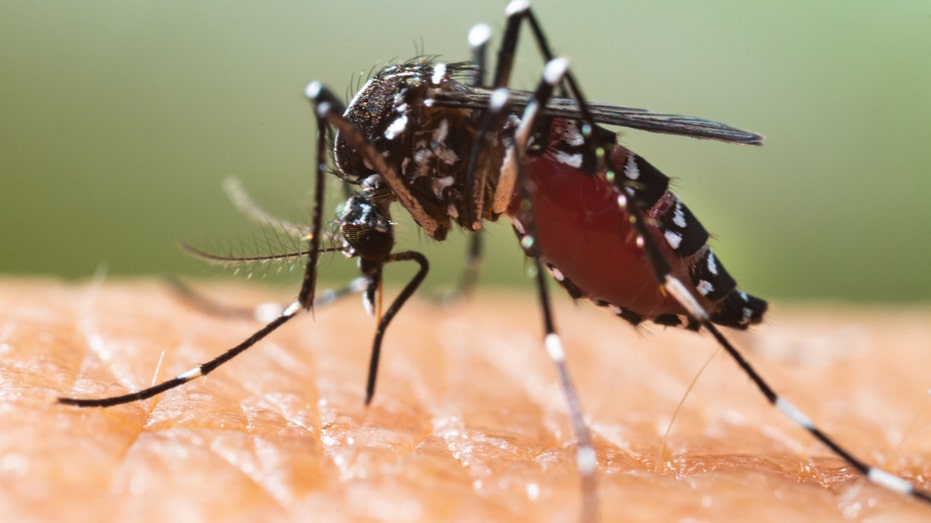As dengue fever continues to spread throughout Europe, experts are blaming an invasive mosquito species as the culprit.
Known as “tiger mosquitoes,” the insects — of the species name Aedes albopictus — have spread into 13 EU countries, according to an alert from the European Centre for Disease Prevention and Control (ECDC).
Elitza Theel, PhD, director of Mayo Clinic Laboratories in Minnesota, confirmed that tiger mosquitoes are a “known vector” for dengue virus and can transmit the virus to individuals who have not previously been infected.
HOW CAN I PREVENT SCARRING FROM BUG BITES AND POISON IVY?
“This mosquito species is concerning for a number of reasons, including that it is considered the most invasive species in the world,” she told Fox News Digital.
“Although typically considered a tropical mosquito, it is able to survive in cooler climates.”
The mosquito species is moving further and further north globally as temperatures grow warmer, the expert said.
“Tiger mosquitoes are also rather aggressive, biting both humans and animals at any time of the day, rather than just at dawn or dusk, which is typical of other mosquito species,” Theel warned.
Health officials claimed that climate change is one of the factors contributing to the spread of these insects.
UNDERSTANDING THE SEVERITY OF THE MOSQUITO-BORNE DISEASE DENGUE
“Europe is already seeing how climate change is creating more favorable conditions for invasive mosquitoes to spread into previously unaffected areas and infect more people with diseases such as dengue,” said Andrea Ammon, ECDC director, in a press release from the agency.
“Increased international travel from dengue-endemic countries will also increase the risk of imported cases, and inevitably also the risk of local outbreaks,” she continued.
“Personal protective measures combined with vector control measures, early detection of cases, timely surveillance, further research and awareness-raising activities are paramount in those areas in Europe most at risk.”
Dengue fever is a virus spread through bites from an infected mosquito.
It is common in the Americas, Africa, the Middle East, Asia and the Pacific Islands, among other countries, according to the U.S. Centers for Disease Control and Prevention (CDC).
Each year, up to 400 million people are infected, the CDC said.
Typical symptoms include aches and pains (in the eyes, muscles, joints or bones), nausea, vomiting and rash, usually experienced within two weeks of being bitten.
Most people experience symptoms for two to seven days before recovering.
“It’s typically a more mild illness, but can be severe, causing headaches, joint pain, fever, abdominal pain and even death,” Dr. Mark Fischer, regional medical director of International SOS, a leading medical and security services company, told Fox News Digital.
MYSTERIOUS ILLNESS TRIGGERED BY TICK BITE COULD AFFECT THOUSANDS, YET MANY DOCTORS ARE UNAWARE OF IT
“One of the reasons for the higher rate of infection is due to the fact that the tiger mosquito, the carrier of dengue, has adapted to living in urban environments and alongside humans,” said Pennsylvania-based Fischer.
There is not currently a medication to treat dengue, the CDC noted.
Infected people are advised to rest, take acetaminophen for pain and fever, stay hydrated and see a doctor.
There is a vaccine available for U.S. children between 9 and 16 years of age who have previously tested positive for dengue and are living in areas where the infection is common.
While dengue fever is most prevalent in the tropics and subtropics, experts warn that it’s also rising globally.
“Based on information from the National Invasive Species Information Center, this species of mosquito was first identified in the United States in 1985 and has established populations in several states,” Fischer told Fox News Digital.
There does not currently seem to be an immediate threat of tiger mosquitoes to the U.S., however, noted Fischer.
“That said, with climate change affecting the globe and tiger mosquitoes thriving in warm temperatures and in urban cities, it is possible that they can become an increasing danger in the coming months and years,” he said.
In 2024, there were 1,984 dengue cases in the U.S., according to CDC data.
TICK BITES AND LYME DISEASE: WHAT TO DO IF A TICK BITES YOU OR YOUR PET
Most of those were reported by people who had been infected outside the country before returning.
“Although this species of mosquito is currently found in the U.S., at present it is considered a nuisance mosquito, because the viruses it is competent to transmit are not circulating or endemic in the United States,” Theel said.
Mosquitoes are considered the world’s deadliest animal because they transmit so many dangerous pathogens, with dengue being the most common — “over 390 million infections annually worldwide,” Theel noted.
While dengue is one of the “most concerning viral pathogens” that mosquitoes transmit, Theel warned that they also transmit malaria, which causes over 240 million infections each year and remains a serious problem in Africa and regions of southeast Asia.
“These mosquitoes can also transmit other viruses, like Chikungunya virus and Zika virus, to humans — and dirofilaria, a parasitic nematode, to both dogs and humans,” she said.
“The West Nile Virus, St. Louis Encephalitis virus and Eastern Equine Encephalitis virus are some of the mosquito-borne viruses that we are concerned with annually in the U.S., all of which can lead to severe neurologic disease and sequelae,” Theel added.
Depending on where in the world they reside, some people may be more at risk for some of these illnesses than others, said Fischer.
“It is important to check your local government resources to see which, if any, of these diseases you may be most susceptible to and make sure you are taking proper precautions to avoid mosquito-borne illness,” he advised.
“Each year, one million people die from mosquito-related illness, so these insects do pose a serious threat to global health.”
In its alert, the ECDC called for “efficient but eco-friendly tools to manage mosquito populations” and recommended “removing stagnant water in gardens or balconies where mosquitoes breed.”
“It’s important to wear insect repellent that contains DEET, picaridin or lemon and eucalyptus oil, as these ingredients are the most effective at repelling mosquitoes and other insects,” Fischer advised.
CLICK HERE TO SIGN UP FOR OUR HEALTH NEWSLETTER
“Those who live in areas with mosquito populations should try to wear long-sleeved shirts and long pants, especially at dusk and in the evening, when mosquitoes are most active, to avoid getting bitten on exposed skin.”
Keeping screens on windows and doors is also a good way to prevent insects from entering and potentially causing the spread of disease, he said.
“If you live in an area that has a high level of mosquito-borne diseases, you should use mosquito nets when sleeping and eliminate any standing water in and around the home, since still bodies of water are breeding grounds for the insects,” Fischer recommended.
“Individuals should always use EPA-registered insect repellent when outdoors in areas where mosquitoes and ticks are prevalent — particularly at dawn and dusk when mosquitoes are most active,” Theel recommended.
For more Health articles, visit www.foxnews/health
“If camping or spending prolonged time outdoors and in forested areas, individuals could consider treating their clothing with permethrin to repel insects as well.”
Article Source: Health From Fox News Read More




